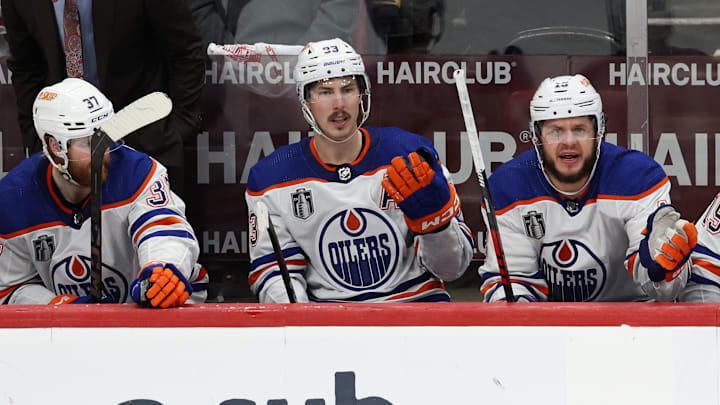3) Ryan Nugent-Hopkins
Ryan Nugent-Hopkins has been a mainstay in Edmonton since being drafted first overall in 2011, earning a reputation as one of the best two-way players in the NHL. His ability to contribute defensively while also providing offensive support has made him an invaluable asset to the Oilers. Nugent-Hopkins plays a versatile role, often switching between center and wing, which showcases his adaptability and skill set. However, the long-term nature of his contract, which carries an annual cap hit of $5.125 million through 2029, could pose challenges for the Oilers as they aim to build a championship-caliber roster.
While Nugent-Hopkins is beloved by fans in Edmonton for his commitment to the team and community, there are growing concerns about his performance in critical moments, particularly during the playoffs. In the past few postseasons, he has struggled to maintain consistent offensive production when the stakes are highest. This lack of scoring when it matters most has led to frustration among fans and analysts alike, who expect more from a player with his experience and skill level.
As the Oilers strive for playoff success, the inability of Nugent-Hopkins to consistently deliver in clutch situations raises questions about his long-term fit on the roster. For a team with Stanley Cup aspirations, relying on a player who can go cold at critical moments is a risky proposition.
Management will have to weigh the value Nugent-Hopkins brings, against the constraints his contract places on the team. If he continues to struggle in high-pressure scenarios, the Oilers may be forced to explore the option of moving his contract to create much-needed cap flexibility. This could allow them to target players who can consistently deliver in the postseason and bolster the overall depth of the team.
Ultimately, Nugent-Hopkins' performance in the coming seasons will be crucial not just for his own career but for the Oilers’ championship hopes. As the team navigates the complexities of the salary cap and seeks to optimize its roster, the future of Nugent-Hopkins may hinge on whether he can reclaim his scoring touch in the playoffs and prove his worth in crucial moments. Time will tell if management opts to retain him as a cornerstone of the franchise, or makes a difficult decision to part ways for the sake of financial flexibility and a more balanced team.
